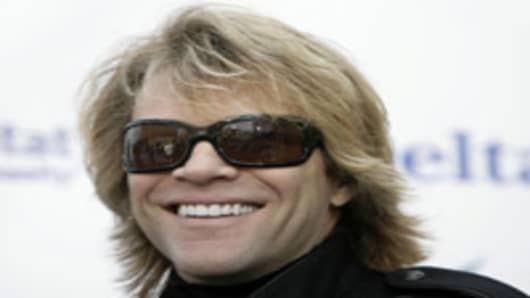So, I ask, "And you're going to be profitable at the end of all this?" "Extremely profitable," he laughs again. Experts say the figure could top $125 million. Not bad for a few months of very hard work.
Surprisingly, as much as Paul pays attention to the top and bottom lines, Jon Bon Jovi himself is watching every dollar very carefully. If Paul is the chief operating officer, or chief financial officer, Bon Jovi is his namesake band's CEO, and the role really comes through when I asked him about the heavy investment the band is making on new technology used during the show.
"It has something to do with value for the dollar," he tells me. "People have a lot of choices in this day and age of how to spend their ancillary income. Record sales are going down, there are very few artists of our stature that can sell this many tickets in this many markets, so we always made a real point to make sure there was value for the money."
I've written about the high-tech, high-def screens used during the show as an example of all this in a previous post, and asked Bon Jovi about the decision to invest in that kind of eye-candy for the show. Sure, he wanted it, but he was also concerned about cost.
"The joke first was, I said (to the engineers), 'Here's the Chinese menu, you can have one (cool thing) from column A or column B,' and they said 'Oh no, we want column A AND column B," he laughs. "Much like building a house or buying that great suit, the guy holds up the window and says 'you can have this window or THAT window,' and you say, 'I want THAT window.' So when they showed me all this, your initial response is, 'Here we go again,' because I had to set limits because honestly, in this economy, I said, 'I want ten trucks, I don't want to go 12; I want to make sure we're not doing 120 guys on the road,' I wanted to knock it back. The initial knee-jerk reaction was to cut some corners, and fortunately for me, being a smart leader, I'm very open to opinions and the objections of those around me, I don't want a lot of 'yes-men.'"
And they convinced him to spend the something-extra on the tech and the investment is paying off.
Since the massive video screens, which run about $2 million a piece (there are four of them), are two-sided, the band can sell seats behind the stage without fans missing any action because of them. "So ultimately, with a little forward-thinking, they're paying for themselves."
The band's emphasis on technology not only keeps them connected to fans in ways that other bands haven't adopted yet, but it's also generating new revenue streams. Take the band's relationship with Vibes Media: fans can text the band before and during the show to choose encores or win a chance to appear on stage. At $1.99 a text, it ain't cheap and may not sound like big money.
But multiply $2 by thousands of texts at a hundred or so shows and pretty soon you're talking real money. Paul's not sure how well the texting thing is gonna go during the tour, but it's certainly something worth trying out, he tells me. Same goes with the relationship with Google's YouTube: letting fans upload home movies that the band can use in future videos. Nothing like free, fan-generated content to help you sell your songs.
Either way, it's Bon Jovi's attention to detail, use of technology and careful scrutiny of the bottom line that keeps this band churning the hits, and the profits, after 25 years in the business.
Questions? Comments? TechCheck@cnbc.com


